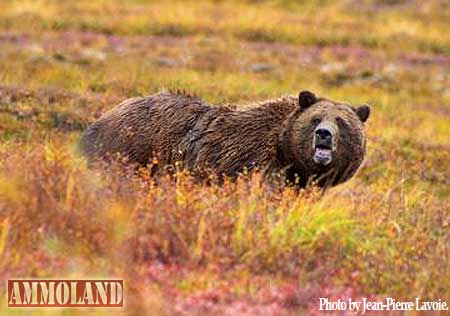

MALTA, Mont. –-(Ammoland.com)- Tips for hunting safely in bear country should be at the top of all hunters’ minds this time of year, and Montana Fish, Wildlife & Parks is working with partners to help get bear safety tips and bear spray into the hands of more Blackfoot-area hunters.
Jamie Jonkel, FWP Region 2 Bear Management Specialist, says that the Blackfoot Valley is an area where black bear and grizzly habitat overlap, and some of the same spots that are attractive to hunters are also spots that bears tend to concentrate.
“When hunters are quietly pursuing game, and especially when they have an animal down, they increase their odds of a bear encounter,” Jonkel says.
FWP Region 2 Block Management Coordinator, Bart Morris, helped launch an effort in 2011 to share more bear safety tips with more hunters. Many of the hunters that Morris wants to reach are those hoping to hunt on one of the Blackfoot Valley Block Management Areas (private lands open to hunters free of charge, as part of a cooperative program between landowners and FWP).
“We have a couple of BMAs in the Blackfoot that have a history of grizzly bear and hunter conflicts, and we are trying to do what we can to share materials and information that can help keep hunters safe,” Morris says.
Hunters hoping to get an opportunity to hunt Shanley and Dick Creek BMAs in the upper Blackfoot gather at the Ovando Community Church every Friday evening during big game rifle season to see if there name will be drawn. Block Management crews have been sharing bear safety tips at these gatherings for many seasons, and last year for the first time they began issuing free cans of bear spray.
Morris says that FWP is continuing this effort this season and could not have done it alone. Money donated from the Sierra Club and the Great Bear Foundation, along with discounted bear spray prices offered by supplier, Counter Assault, helped FWP offset the costs to purchase these bear spray canisters. In addition, Counter Assault donated a box of inert spray for hunters to practice with before heading to the field.
“We handed out nearly 100 canisters last year, and thanks to these partnerships, we are geared up to hand out the same number this year,” Morris says.
As part of this larger bear safety effort in the Blackfoot, the Block Management Program also instituted a food storage requirement on all Blackfoot BMAs that offer overnight camping. Hunters must now store food and all other potential bear attractants, such as garbage and pet and livestock food, in a bear resistant container in these areas.
“This is a regulation that is in place the neighboring National Forest lands and we wanted to carry it forward in the effort to decrease bear and human conflicts in more places,” Morris says.
In addition to the partners that have helped make the bear spray purchases possible, Morris and Jonkel point to the important role that Blackfoot landowners, residents and hunters continue to play in sharing these bear safety messages.
“There is huge value in the information sharing that goes on between those that live and spend time in the Blackfoot and can offer current updates on bear activity and reminders on conflict prevention, ” Jonkel says. “We hope that all this heightened bear awareness, combined with bear spray in the hands of more people, will help to keep hunters safe out there.”
